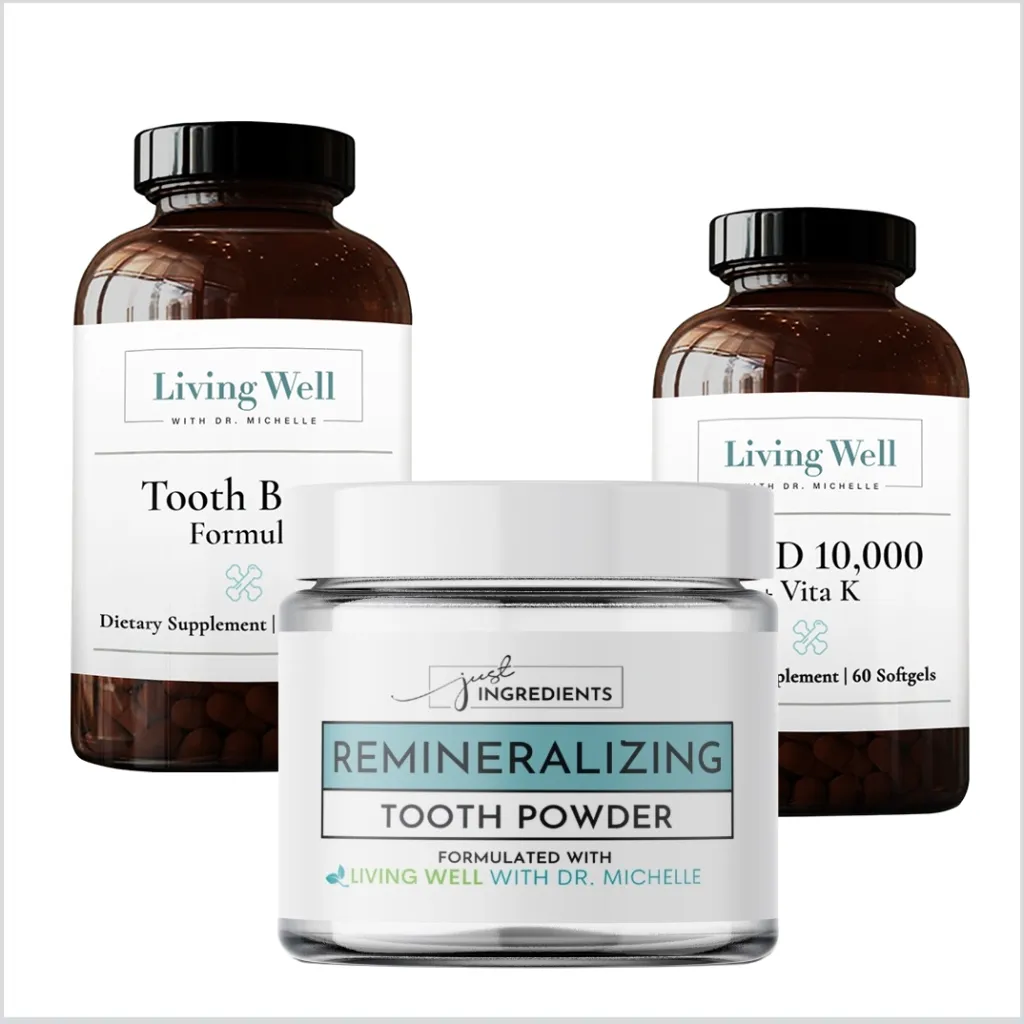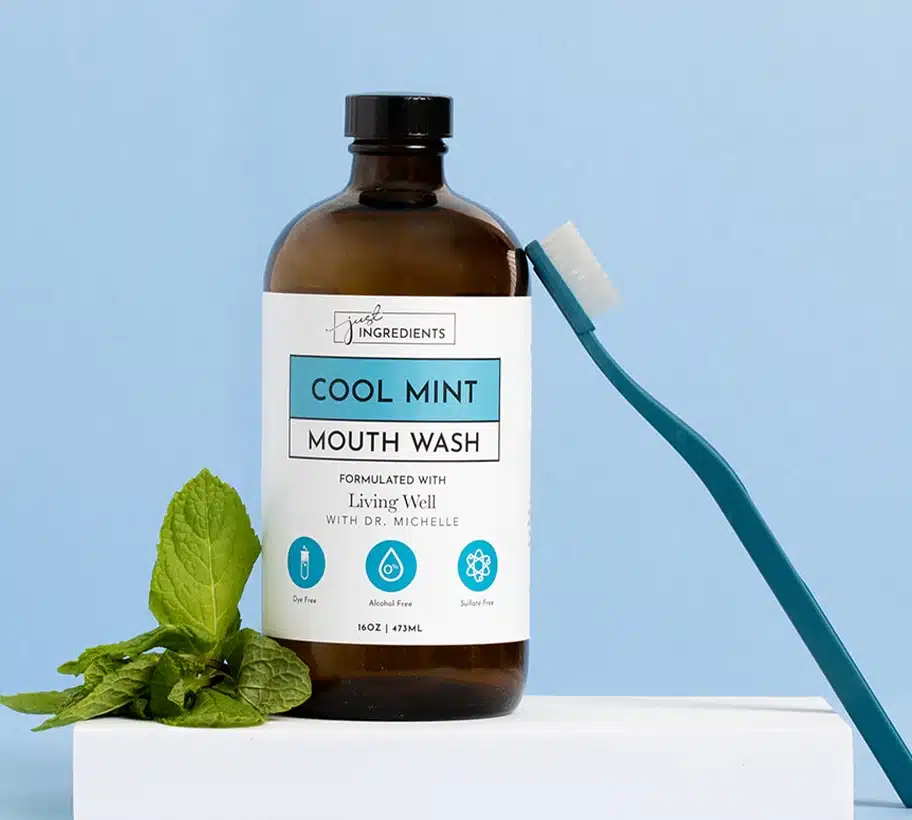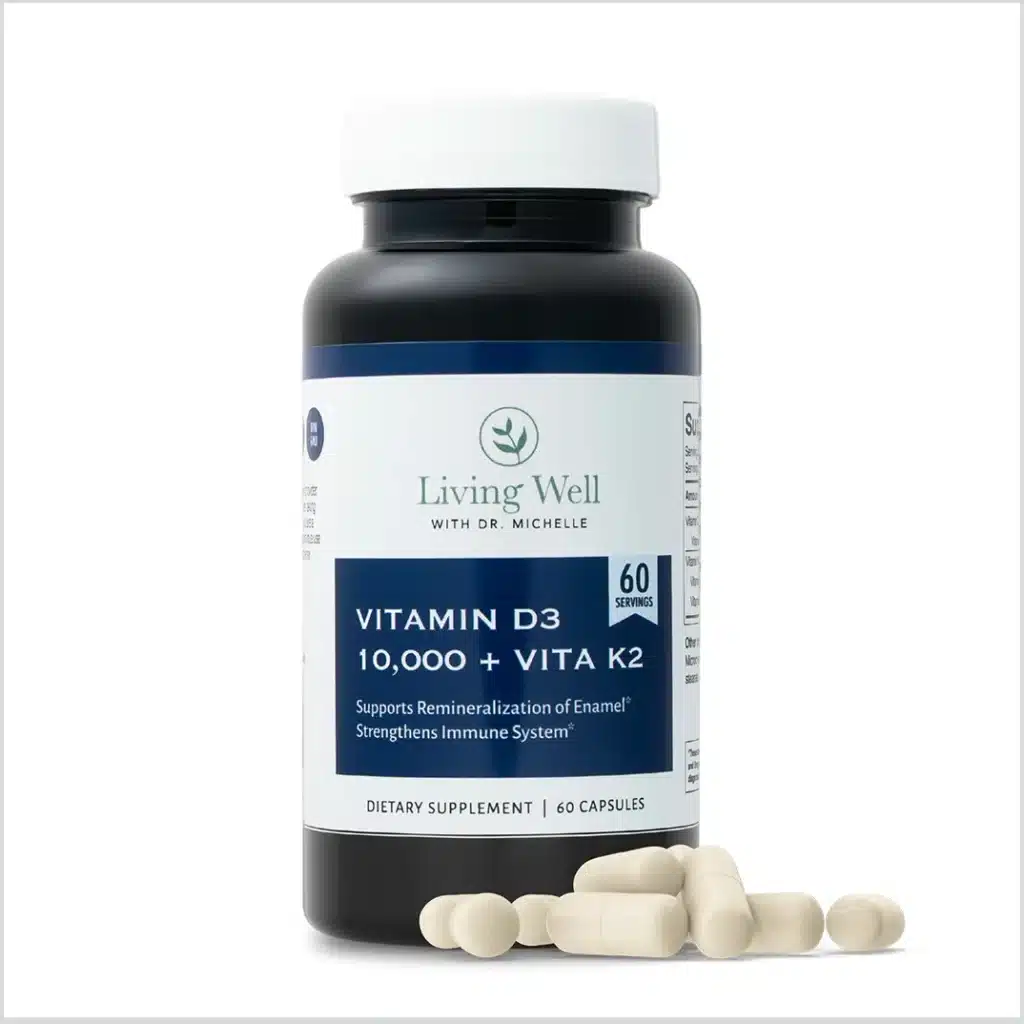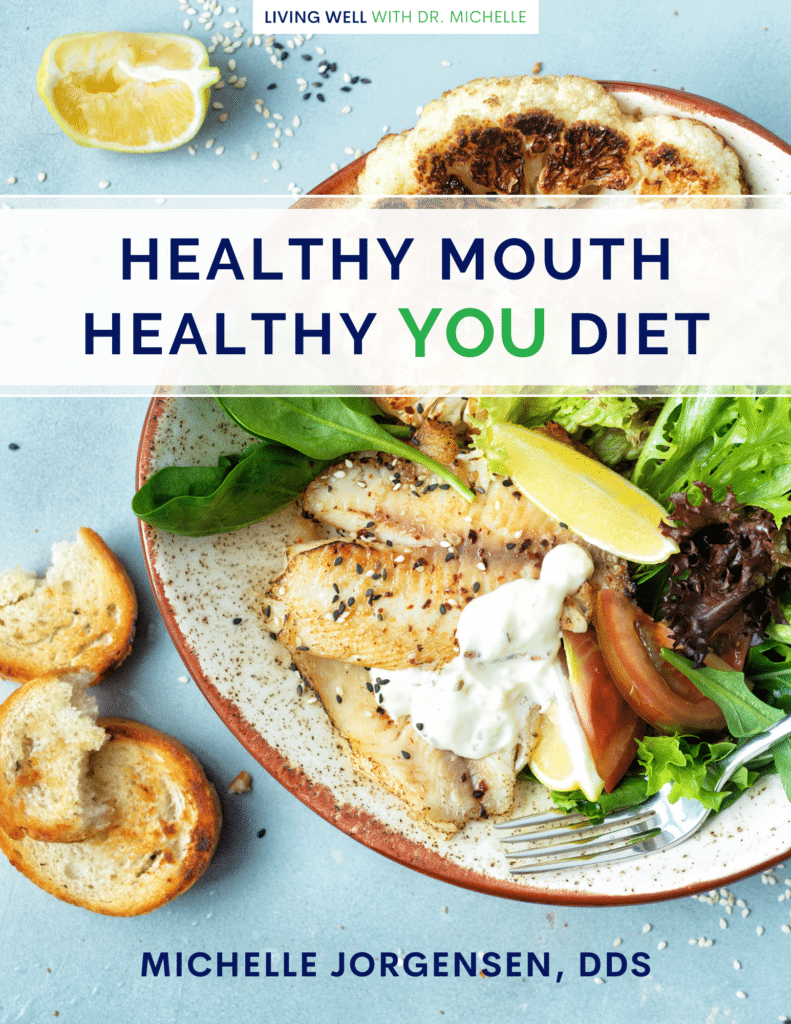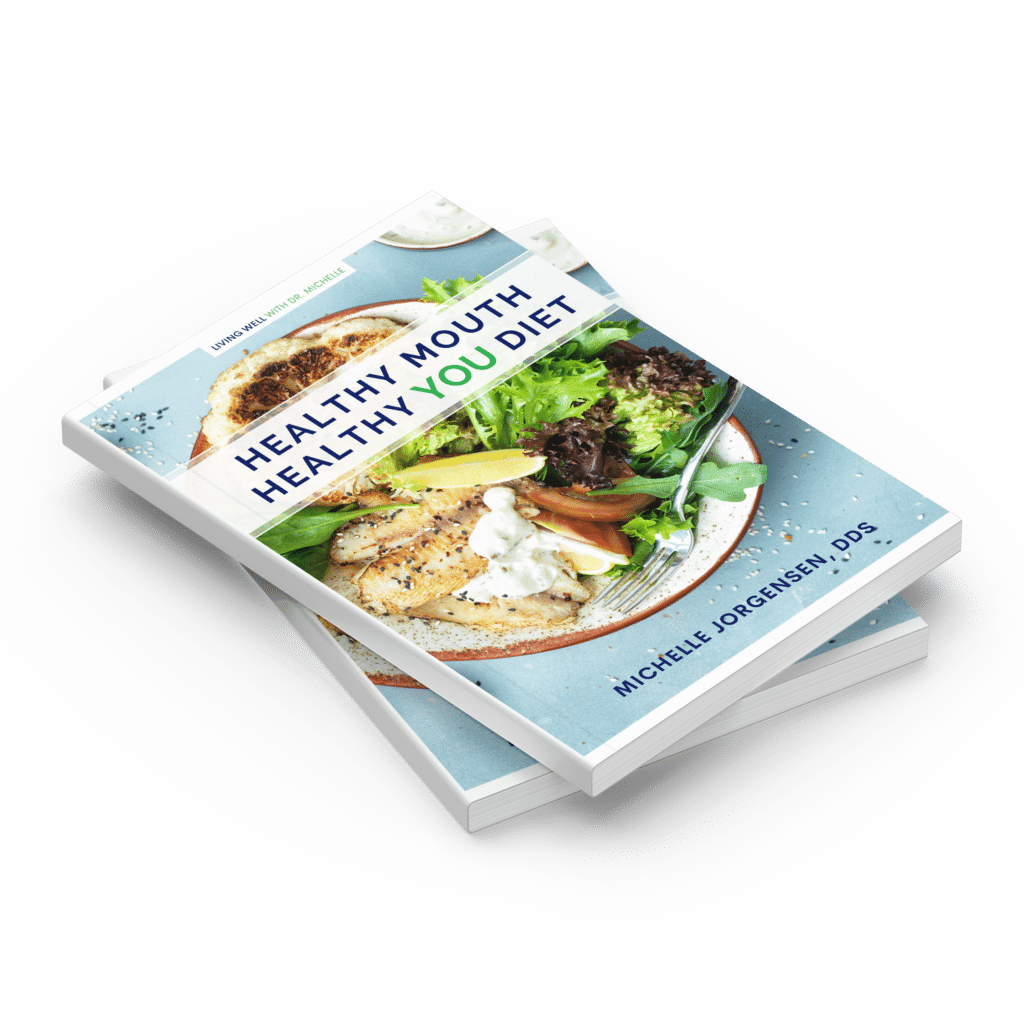
Dr. MIchelle Jorgensen
Understanding Cold Sores and Canker Sores: Causes, Symptoms, and Treatments
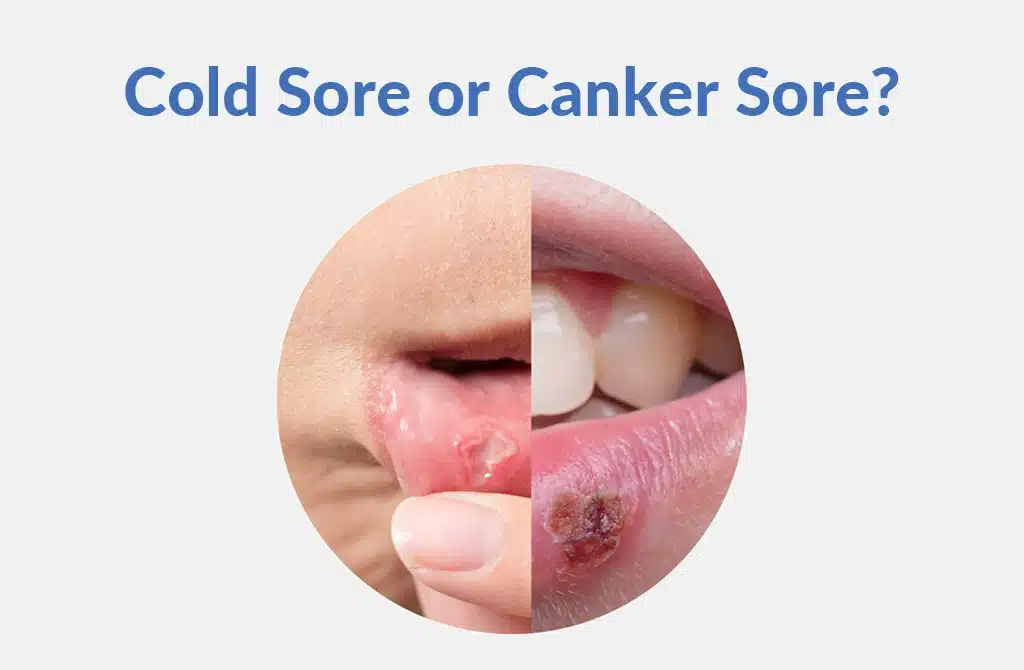
Cold sores and canker sores are two common types of mouth sores, but they have distinct causes, symptoms, and treatments. Cold sores are caused by the herpes simplex virus, leading to painful blisters that can recur. Recognizing the differences between these sores can help you seek the right care to reduce discomfort and prevent future outbreaks.
What Are Cold Sores?
Cold sores, also known as fever blisters, are small fluid-filled blisters that typically develop on or around the lips, nose, or chin. They are caused by the herpes simplex virus, specifically herpes simplex virus type 1 (HSV-1), though in some cases, herpes simplex virus type 2 (HSV-2) may be involved. These sores are highly contagious and can be transmitted through direct contact or shared items like towels or utensils.
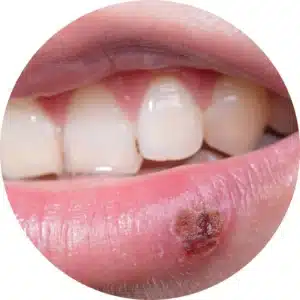
Cold sores often begin with a tingling sensation or itching before developing into painful blisters. Common triggers include stress, sun exposure, hormonal changes, or a weakened immune system. Once a person contracts the herpes simplex virus, it remains in the body and can cause recurring outbreaks.
Symptoms of Cold Sores:
Small, fluid-filled blisters on the lips or around the mouth
Burning or tingling sensation before the blisters appear
Painful, crusting sores that can last up to two weeks
Swollen lymph nodes during severe outbreaks
Causes and Triggers of Cold Sores:
Herpes simplex infection
Sun exposure
Stress and anxiety
Viral infections like colds or the flu
Cold sores are highly contagious, especially when the blisters are active. It’s important to avoid close contact with others and refrain from sharing personal items during an outbreak.
What Are Canker Sores?
Unlike viral cold sores, canker sores (also known as aphthous ulcers) are not contagious and are typically triggered by different factors. These painful ulcers develop inside the mouth on the gums, cheeks, tongue, or lips. They appear as small, shallow sores with a white or yellow center and a red border.
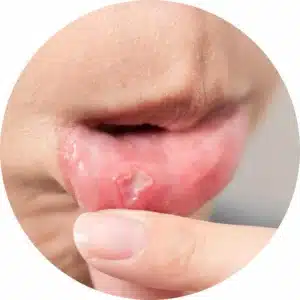
Canker sores can make eating or talking uncomfortable and are more common in teens and young adults. Hormonal changes may also increase the likelihood of developing these sores, particularly in women.
Symptoms of Canker Sores:
White or yellow sore with a red border
Pain or discomfort inside the mouth
Swollen lymph nodes in severe cases
Difficulty eating or talking
Causes and Triggers of Canker Sores:
Stress and anxiety
Hormonal changes
Nutritional deficiencies, including folic acid and vitamin B12
Trauma from biting the inside of the mouth or irritation from dental appliances
Acidic foods like citrus fruits and spicy foods
Although the exact cause of canker sores is unknown, food allergies and vitamin deficiencies can increase the risk of developing them.
Key Differences Between Cold Sores and Canker Sores
Feature | Cold Sores | Canker Sores |
|---|---|---|
Cause | Herpes simplex virus | Not caused by a virus |
Contagious | Highly contagious | Not contagious |
Location | Outside the mouth (lips, nose, chin) | Inside the mouth (gums, cheeks, tongue) |
Appearance | Small, fluid-filled blisters | White or yellow sore with a red border |
Duration | Up to two weeks | Typically heals in a few weeks |
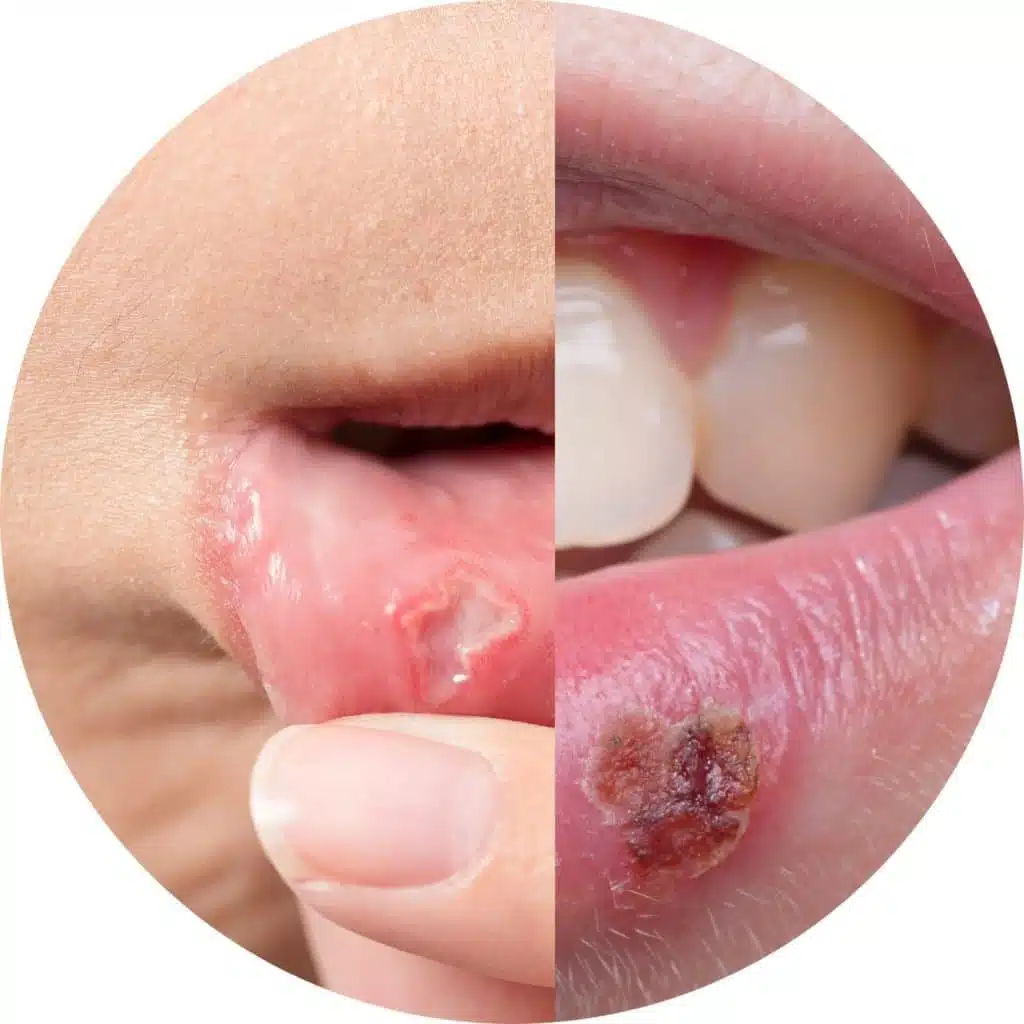
Prevention Tips for Cold Sores and Canker Sores
Cold Sore Prevention Tips:
Avoid close contact with people who have active cold sores.
Use lip balm with sunscreen to protect your lips from sun exposure.
Manage stress with relaxation techniques.
Wash your hands regularly to prevent the spread of the herpes simplex virus.
Take antiviral medications if recommended by your doctor.

Canker Sore Prevention Tips:
Practice good oral hygiene with regular brushing and mouth rinses.
Avoid acidic foods and spicy foods that may trigger sores.
Incorporate stress reduction techniques like yoga or meditation.
Address nutritional deficiencies by taking supplements for folic acid, vitamin B12, and iron.
Treatment Options for Cold Sores and Canker Sores
If you’re dealing with cold sores or canker sores, Total Care Dental offers effective treatments to speed healing and reduce discomfort.
Lightwalker Laser Treatment
The Lightwalker Laser is a cutting-edge treatment for both cold sores and canker sores. This laser technology helps reduce inflammation and promotes faster healing by targeting the sore directly. For cold sores, it can inactivate the herpes simplex virus at the site of the outbreak, often preventing the sore from fully developing. For canker sores, it provides pain relief and speeds recovery.
Natural Remedies from Living Well with Dr. Michelle
In addition to professional treatments, you can boost your healing with natural products designed to soothe sore areas and strengthen your immune system.
Remineralizing Mouthwash: Contains marshmallow root to soothe irritated areas and promote healing. Great for both canker sores and cold sores.
Vitamin D/K: Helps strengthen your immune system, supporting faster recovery from sores. This supplement is available from Living Well with Dr. Michelle.
Other Natural Remedies for Cold Sores and Canker Sores
Cold Sore Remedies:
Ice: Apply an ice pack to reduce swelling and pain.
Aloe Vera: Apply the gel to soothe the sore and promote healing.
Tea Tree Oil: Known for its antiviral properties, this can be diluted and applied to cold sores.
Canker Sore Remedies:
Saltwater Rinse: Gargle with warm saltwater to reduce inflammation.
Honey: Apply raw honey to benefit from its antibacterial properties.
Aloe Vera Gel: Soothe pain and promote healing.
When to See a Doctor

Most canker sores heal on their own within a few weeks, but if you experience severe or persistent sores, it’s time to see a doctor. Similarly, if you have cold sores that don’t improve or become frequent, professional treatment may be necessary.
Seek medical advice if you experience:
High fever or difficulty eating and drinking
Swollen lymph nodes
Recurring sores
At Total Care Dental, we provide comprehensive care to help you manage and treat mouth sores effectively.
Conclusion
Both cold sores and canker sores can cause discomfort, but understanding the differences and exploring effective treatments can help you manage outbreaks more efficiently. Whether it’s using the Lightwalker Laser at Total Care Dental or supplementing your healing with Living Well with Dr. Michelle products, you have options to feel better faster.
Schedule your consultation for laser treatment today, or explore our natural product offerings to enhance your healing process.
Our tooth powder is a fluoride toothpaste alternative that helps to remineralize enamel, prevent tooth decay, and reduce tooth sensitivity. It’s made with healthy ingredients and is free from harmful chemicals.
Benefits:
Strengthens enamel with hydroxyapatite
Helps prevent dental caries and dental decay
Reduces tooth sensitivity naturally
Safe for all ages, including children and pregnant women

Dr. MIchelle Jorgensen
Dr. Michelle Jorgensen is an author, speaker, teacher, biologic/holistic dentist, and health and wellness, provider.
Dr. Michelle Jorgensen is also a Board Certified Traditional Naturopath and has received certifications as a Therapeutic Nutritional Counselor, and a Certified Nutritional Autoimmune Specialist. She completed a Holistic Dental Mini-Residency and is pursuing ongoing training from experts around the world in health-related fields.
Dr. Jorgensen also teaches and coaches groups of dental professionals across the country through her Living Well Professionals training. They learn how to integrate dentistry with other health disciplines to provide an integrated, whole body approach to care.


